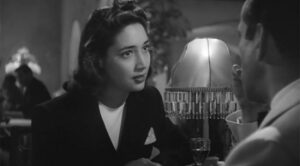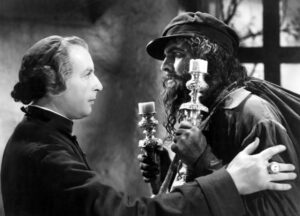by James Scott Bell
@jamesscottbell

Sidney Poitier in Lilies of the Field (1963)
I believe writers are here to “bring the light.” It’s a dark world out there and most readers, I venture to say, don’t want more of the same in their leisure hours.
By that I don’t mean we avoid the harsher edges in our fiction. Indeed, that’s what the best thrillers take us through in order to deliver us at the end.
I do mean, though, that light (e.g., hope, justice) is a powerful—even necessary—element for today’s market.
Which brings me to the subject of lovely moments.
The other night Mrs. B and I re-watched one of our favorite movies, Lilies of the Field. This 1963 gem was a low-budget production that ended up nominated for five Oscars, including Best Picture and Adapted Screenplay. Sidney Poitier took home the Best Actor prize for his performance. Lilia Skala, the Austrian actress, was nominated for her supporting role (and should have won, in my humble opinion).
It’s the story of an itinerant worker, Homer Smith (Poitier), who is driving his old station wagon across the Arizona desert. His car needs water, so he pulls into the only homestead within miles. It turns out this is the humble dwelling of five nuns who are scraping out their subsistence by growing vegetables, raising chickens, and milking one cow. The nuns do not speak much English. We learn later they escaped over the Berlin Wall and came 8,000 miles to this desolate place.
The iron-willed Mother Superior (Skala) is convinced that God has sent “Schmidt” to them for a very special purpose—to build a chapel for the poor, mostly Mexican locals to attend mass.
Mass for this community is administered outside a local hash house by a priest who works out of a motor home. In a conversation with Homer, the priest admits that when he was ordained he prayed to be called to a majestic cathedral in some wealthy diocese. Now, he notes ruefully, he has to pray that his tires don’t blow out.
Near the end, with the chapel finished, the priest is brought in to see where he will now be saying the mass. He is so moved he can hardly speak. Finally, he says to the Mother Superior, “Many years ago, I made a very vain and selfish prayer. Now He has answered my prayer through you, through many people. I pray now I become worthy of His trust. And yours.”
A lovely moment. It’s with a minor character, but it deepens the emotional impact of the entire film.
So I’ve been thinking about how to add such moments to our fiction. Here are two prompts:
- Where can your Lead show mercy?
One of the best examples of this type of moment is from, not surprisingly, Casablanca. A desperate young wife asks Rick to answer the most important question in her life. She and her husband, refugees from Bulgaria, are desperate to get out of Casablanca, but need exit visas signed by the French police captain, Louis Renault. These visas cost serious money. The husband is trying to raise it in the gambling room, but is losing. The wife, however, has been approached by Louis (offscreen) with his standard offer—if she will sleep with him, he will grant the couple their visas.

Casablanca (1942, Warner Bros.)
The young wife wants to know if Renault is a man of his word. Rick knows immediately why she’s asking. He tells her, with cynical disdain, that yes, he’s a man of his word.
Then the wife wants to know something else:
“Monsieur, you are a man. If someone loved you very much, so that your happiness was the only thing that she wanted in the world, and she did a bad thing to make certain of it…could you forgive her?”
Bitterly, Rick says, “Nobody ever loved me that much.”
She goes on: “And he never knew, and the girl kept this bad thing locked in her heart, that would be all right, wouldn’t it?”
“You want my advice?”
“Yes, please.”
“Go back to Bulgaria.”
But a few minutes later Rick goes to the roulette table and suggests the husband bet everything on 22. The croupier picks up the cue, and 22 wins. Rick says, “Leave it there.” And 22 wins again.
Rick tells the husband, “Now cash it in and don’t come back.”
A lovely moment. So lovely that when the Russian bartender hears what Rick has done, he rushes over to give Rick a kiss on the cheek!
This is also what I call a “Pet the Dog” beat, which is where the Lead forgets for a moment his own troubles in order to help someone who is weak or vulnerable. He doesn’t have to do so. Indeed, his action puts him in jeopardy (Louis begins to suspect Rick is not as neutral as he claims to be). But the action bonds us deeply to the Lead, compelling us to read on.
- Where can your Lead be shown mercy?

Les Misérables (1935, 20th Century Pictures)
Who can forget the mercy shown to Jean Valjean in Victor Hugo’s Les Misérables? When the ex-convict is fed by a kind priest, Valjean repays him by stealing a basket of silverware. He doesn’t get very far before the gendarmes nab him and drag him back to the priest’s abode. They have caught him red-handed with stolen silver! Now all the priest has to do is make a complaint and Valjean will be back in prison forever. They are not prepared for what the priest does next:
“Ah! here you are!” he exclaimed, looking at Jean Valjean. “I am glad to see you. Well, but how is this? I gave you the candlesticks too, which are of silver like the rest, and for which you can certainly get two hundred francs. Why did you not carry them away with your forks and spoons?”
Jean Valjean opened his eyes wide, and stared at the venerable Bishop with an expression which no human tongue can render any account of.
“Monseigneur,” said the brigadier of gendarmes, “so what this man said is true, then? We came across him. He was walking like a man who is running away. We stopped him to look into the matter. He had this silver—”
“And he told you,” interposed the Bishop with a smile, “that it had been given to him by a kind old fellow of a priest with whom he had passed the night? I see how the matter stands. And you have brought him back here? It is a mistake.”
“In that case,” replied the brigadier, “we can let him go?”
“Certainly,” replied the Bishop.
The priest then gets the silver candlesticks and hands them to a bewildered Jean Valjean.
“Now,” said the Bishop, “go in peace. By the way, when you return, my friend, it is not necessary to pass through the garden. You can always enter and depart through the street door. It is never fastened with anything but a latch, either by day or by night.”
Then, turning to the gendarmes—
“You may retire, gentlemen.”
This is, of course, the great turning point in Valjean’s life. And an unforgettable moment in a classic novel.
What lovely moments in books or films are memorable to you?

Thanks for a great post, Jim, on a topic that is not often covered.
My favorite “lovely moment” is the vignette you mentioned from Les Miserables. In the musical adaptation, there is a scene at a point after that where an aged Jean Valjean is unpacking his belongings. The two chalices are still among them. the inference is that he kept them as a remembrance instead of selling them, even though he lived pretty much of a hand-to-mouth existence. There is no comment on it and the scene only lasts for a moment but I can’t get it out of my head.
Hope you’re having a great weekend.
Ah, great example, Joe, associating the lovely moment with a visual. That doubles the power. One of my favorite visuals is at the end of Lethal Weapon, when Riggs comes to Murtaugh’s house on Christmas Eve. Murtaugh’s daughter answers the door. Riggs asks her to give her father something–a bullet wrapped in a ribbon. “Tell him I won’t be needing it anymore.” It’s the hollow point Riggs has been carrying around since his wife’s death, the one he wanted to use on himself.
Good morning, Jim. Such an important topic, and, as Joe noted, not often discussed. One example that springs to mind is also from the musical version of “Les Miserables,” when Jean Valjean pledges to the dying Fantine that he will care for her infant daughter. A true moment of mercy. Brings tears to my eyes every time.
The opening ten minutes of the Pixar film “Up,” which shows Ellie and Carl’s life together, is a sure-fire tear-jerker. Maybe less about mercy, but such a lovely moment.
Then there’s the heroic mercy of the Iron Giant, in the film of the same name, who flies up to meet the oncoming missile and save the town below from nuclear destruction, saying the words, “Superman.”
Thanks for today’s thought provoking post!
My wife, daughter and I were privileged to see an advance screening of UP. After that opening, we were a mess. So well done, and another great lesson: it was all visual, no talking at all. Thanks for sharing that, Dale.
Great post, JSB. Great question to apply to my characters.
One of my favorite movies is Last of the Mohicans, starring Daniel Day Lewis. (And he’s one of my favorites-a consummate character actor.) The setting is the French and Indian War in the year 1757.
The lovely moment for me was toward the end, when Major Duncan Heyward, played by Steven Waddington, chooses to take the place of Cora, played by Madeleine Stowe, in the execution fire. An example of a secondary character, as you stated above, making the lovely moment happen. What makes it even more poignant is that Heyward is in love with Cora, but knows that she is in love with Hawkeye, Lewis’s character. Heyward’s character arc, from pompous a** to willingly sacrificing himself, comes full circle.
So the Major is burned at the stake as Hawkeye and Cora are allowed by the Hurons to leave. A tear-worthy moment indeed.
That’s a superb example, Deb. Makes me want to see that movie again! Thanks.
“Last of the Mohicans” is one of my favorites, too. The scene you mention, Deb, is riveting.
Don’t forget that Hawkeye mercifully shoots Duncan while he’s burning, saving him from actually burning to death.
Right! Another reason to love the story!
I liked what John Gilstrap did in his second Grave’s book, “Hostage Zero.” Johnathan Grave went out of his way in this one. Not only to bring back the kids he felt responsible for, but he offer huge lifeline to a homeless man and changed his life. It set up a pretty reader to be vested till the end.
Heart…a Gilstrap trademark. Good example, Ben.
Wow. I’m so touched. Thank you, Ben.
Great examples of lovely moments, Jim. “Bring the light” is a wonderful reminder to all of us.
I would pick a lovely moment in The Fugitive that you’ve mentioned before. Dr. Kimble risks being discovered when he realizes a young boy has been misdiagnosed and, if I remember correctly, he changes the orders on the boy’s chart.
Kay, that is perhaps my all-time favorite “pet the dog” example. I use it in all my teaching. It’s so great to show the humanity of Kimble, the doctor, who cannot help himself…the boy needed him. And masterfully, the act gets him in further trouble. Perfect!
A little bit from that moment is when Kimble, now outed, is escaping down the stairs and almost bumps into someone. And he says, “Excuse me.” Even then he’s decent!
Excellent post. Even in my very pulpy short stories, I can’t help but look to insert these moments.
The bigger question is how did a lifelong Catholic like me never hear of Lillies of the Field? I have to watch it. It reminds me of The Power and the Glory by Graham Greene. I recently read it and was moved by a moment where the priest in hiding procures some wine to say a secret mass with villagers but has to watch as drunken bureaucrats in his dystopian land slowly drink every last drop. That moment is a defeat but it’s moving to the reader because we know the priest is sinful and fallen but he’s redeemed by his desire to still fulfill his vow to the remaining faithful.
Philip, you are in for a treat with Lilies of the Field. It was based on a novella by William Edmund Barrett, also a wonderful read. Enjoy!
Jim, your posts always resonate with me. I can’t think of an example (my mind’s full of research at the moment), but I know I’ve seen the “pet the dog” moment in movies. I’ve also included the milestone in my novels. Thank you for another thought-provoking post. Hope you’re enjoying your weekend!
Thanks so much, Sue. May this weekend relax you and unstuff that creative mind of yours!
Excellent and thought-provoking post, Jim!
Like Joe, I, too, absolutely love that moment in Les Mis with the chalices. In an age (of movies) where directors tend to over-explain everything to the audience, I love the classic moment more for the fact that it is unannounced,
I think this idea of “bringing the light” is incredibly important. Some might see it as always having a “happy ending” but as a writer, reader, and movie-goer, I dislike that. It’s possible to show grace via characters without tying the neat bow before credits roll.
It brings to mind a funny meme I saw on a social media writer’s group:
—–
Me, as a reader: STOP HURTING THE CHARACTERS! HOW DARE YOU…!
Me, as an author: Look at this poor glowstick.
Character: I’m not a glow–
Me, as an author: *snaps the character multiple times* Ah, look at him shine!
——
Perhaps it’s because I write and read some pretty dark stuff, but that makes me chuckle!
A chuckle is welcome, Cyn. Which brings up another point when we’re writing “dark stuff.” A bit of comic relief really helps. Hitchcock always had it in his suspense. It takes the audience on a great ride, because just after the comic part we’re hit with even greater trouble.
That moment in CASABLANCA costs Rick nothing, he can afford the gambling loss, but it changes everything for someone else. It also shows there is something good in his cold, dead heart. A set up so his final noble sacrifice doesn’t come out of nowhere. Good writing.
A TV episode, but keeping with the priest theme, an episode of GUNSMOKE called “Trafton” with Victor French as a man emotionally and morally destroyed by the Civil War. It’s some of the finest writing I’ve seen anywhere. He shoots a priest for the church silver, but, as he bends over the dying priest, the priest forgives him and marks his forehead with the cross. The rest of the episode is about Trafton trying to figure out why someone would forgive him, facing his own past with the destruction he has caused, and paying for it. Every time he sees something that makes no sense in his broken-soul worldview, his moments of light, he scrubs violently at his forehead as if that cross is burning through his brain. In the end, he commits suicide by cop, says “I forgive you,” and tries to mark Matt Dillion’s forehead with a cross. Very, very powerful.
Ah, always appreciate a good Gunsmoke reference, Marilynn. Thanks.
I will differ with you slightly on Rick. It does cost him something. He’s been trying hard to appear neutral to Louis, so he can keep his place open. But Louis notices what Rick does in the gambling room. Indeed, Louis confronts him later with, “As I suspected. You’re a rank sentimentalist.”
The cat is sticking its nose out of the bag.
Thanks, JSB, for another brilliant and timely post. Once again my favourite writing guru comes to the rescue.
I had been floundering around in the plot and had forgotten all about the pet-the-dog idea. It slots in nicely, and I’m moving forward again.
Thanks, Lynda. I like the way you put it, a “slot.” There are lots of those opportunities in our fiction. Go for it!
There are so many. The first one that popped into my head just now is the “Let’s go home, Debbie.” moment from The Searchers.
Hmmm. Just realized Casablanca and The Searchers share an actor.
Yes, the great character actor John Qualen. Always quality from him!